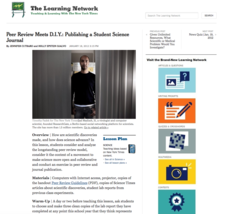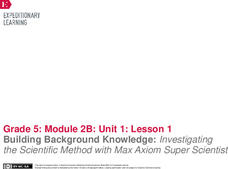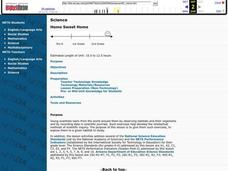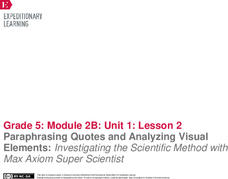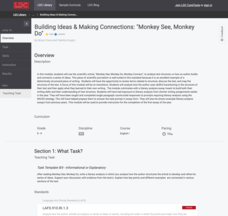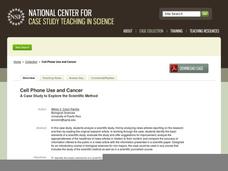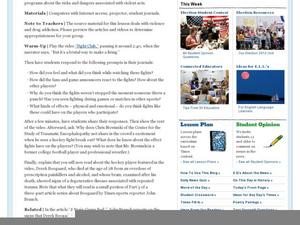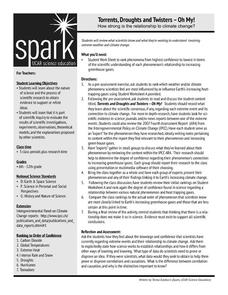Curated OER
Peer Review Meets D.I.Y.: Publishing a Student Science Journal
Peer review of science laboratory reports? You bet! First, learners work in pairs to review a scientific article. Then they trade lab reports for peer review. The end result is the publication of a classroom scientific journal!
Virginia Department of Education
Scientifically Speaking
Explore the connection between operations with scientific notation and the laws of exponents. Scholars work on a set of word problems involving operations with scientific notation. Along the way, they consider how the laws of exponents...
EngageNY
Building Background Knowledge: Investigating the Scientific Method with Max Axiom Super Scientist
Let's have a look at something different. Scholars take a look at the text Investigating the Scientific Method with Max Axiom Super Scientist and discuss how the structure, graphics, and images appear different than previous works...
Curated OER
A Valid Conclusion? Testing and Reporting on Hypotheses Using the Scientific Method
Students explore importance of accuracy in reporting, focusing particularly on articles documenting scientific discoveries, and practice scientific method by conducting experiments to test and report on scientific hypotheses.
Curated OER
Reviewing the Scientific Process
Students investigate the scientific method by reading science journals. In this scientific research lesson, students read several articles of the National Inquirer and analyze the specific parts of an article. Students...
EngageNY
Analyzing How Rainforest Scientists Communicate Their Research (Pages 39–42)
How do you say that? Learners read pages 39-42 of The Most Beautiful
Roof in the World to analyze how the rainforest scientists communicate their research. They record their ideas in a KWL chart and then work in groups to explain...
Curated OER
Home Sweet Home
Students enjoy investigating and becoming aware of the habitats around them. They record their observations in scientific journals. Data collection can take the form of a simple drawing or taking digital photos or videos in the habitats...
EngageNY
Revision and Illustration: Strengthening the Writing in my Rainforest Field Journal and Adding a Labeled Drawing
Let me draw you a picture. Scholars read a quote from Roger Tory Peterson and discuss his views on drawings. They then create their own drawings of an ant or butterfly to add to their science journals.
Curated OER
Reading And Summarizing in Science
Students read articles about various scientific topics from a variety of science disciplines and a variety of sources including newspapers, the internet, scientific journals and magazines for students. They review the articles...
EngageNY
Paraphrasing Quotes and Analyzing Visual Elements: Investigating the Scientific Method with Max Axiom Super Scientist
Pay close attention. Learners discuss the things close readers do and record them in a chart. They then silently reading section 1 of Investigating the Scientific Method wit Max Axiom Super Scientist and write the gist of the text in...
EngageNY
Reading an Interview: “Sloth Canopy Researcher: Bryson Voirin”
It's time to slow down and learn about sloths! Scholars read the first few questions of an interview with a sloth canopy researcher, looking for the gist. Next, they create a glossary in the back of their journals to add new scientific...
Curated OER
Short and Sweet Science
Readers learn how to summarize scientific text and evaluate the advantages, disadvantages, and challenges in writing summaries. They select science-related articles you've pulled and collected from the New York Times and, with a partner,...
Curated OER
Can Scientists Discover a Limit to Discovery?
Is there anything left to discover? Evaluate opposing sides of the debate regarding whether or not there is a future for scientific discovery. Middle and high schoolers assess quotations from the articles included to evaluate claims and...
Curated OER
'Hunger Games' Science: Investigating Genetically Engineered Organisms
In The Hunger Games novel and movie, a futuristic, dystopian society is the setting. In it, a genetically engineered bird escapes control of the government. Using this as a starting point, teenagers examine the realistic possibility of...
Literacy Design Collaborative
Building Ideas and Making Connections: "Monkey See, Monkey Do"
Reading a scientific article about cross-species synchronization may sound like a yawner. But "Monkey See, Monkey Do" is a fascinating tale that just happens to be about yawning, within and across species. After a close reading, class...
National Center for Case Study Teaching in Science
Cell Phone Use and Cancer
The cell phone you're using is making you deaf: news at 11:00. Oftentimes, the media uses fear tactics and other techniques to increase its audience base. In an intriguing look at the difference between scientific journals and...
EngageNY
Determining Author’s Opinions, Reasons, and Evidence: Signs of Hope and Progress for African Americans in the 1920s (Promises to Keep, Pages 14–15)
Caption this. Readers look at the text features in Promises to Keep and pay special attention to the photographs and captions before adding to the Features of Informational Text anchor chart. Learners then answer questions about life in...
Curated OER
On 'Punched Out': Looking at Brain Trauma and Other Risks of Violent Sports
The tragic story of Derek Boogard, a hockey star whose sports-related brain injuries eventually lead to his death, is told through a series of videos. There are also articles that can be read. This poignant instructional activity gets...
Center Science Education
Torrents, Droughts, and Twisters - Oh My!
What is causing the extreme weather happening around the planet? Middle and high schoolers read about climate change as a possible link to such phenomena. Then they form groups to discuss and research one of the types of weather events....
EngageNY
Structuring The Search: Categorizing Our Research
What can you contribute? Scholars read text to determine how ants contribute to the rainforest. First, they categorize and sort facts gathered from reading. Next, readers focus on specific terms in each paragraphs of the text Ants by...
Curated OER
SWOOP Reading
First graders read fluently. In this phonics lesson plan students practice reading strategies for fluency. They write a response in their journal about the book read in class.
Curated OER
Scientific Scenes
Students discover how the public's perceptions of science have changed throughout recent history; then research scientific and technological breakthroughs in a variety of areas. They then create plays that allow scientists to encounter...
Curated OER
Community Journals
Students visit a multimedia online journal as a model for their research and journal about their own communities. They examine writing for themselves and writing for an audience as they study the community and present it in more than one...
Curated OER
It's Up In the Air
Learners examine a variety of tools that are used to collect scientific data. They conduct an experiment that reveals what type of particles is in the air at their school. Students report on their findings.
